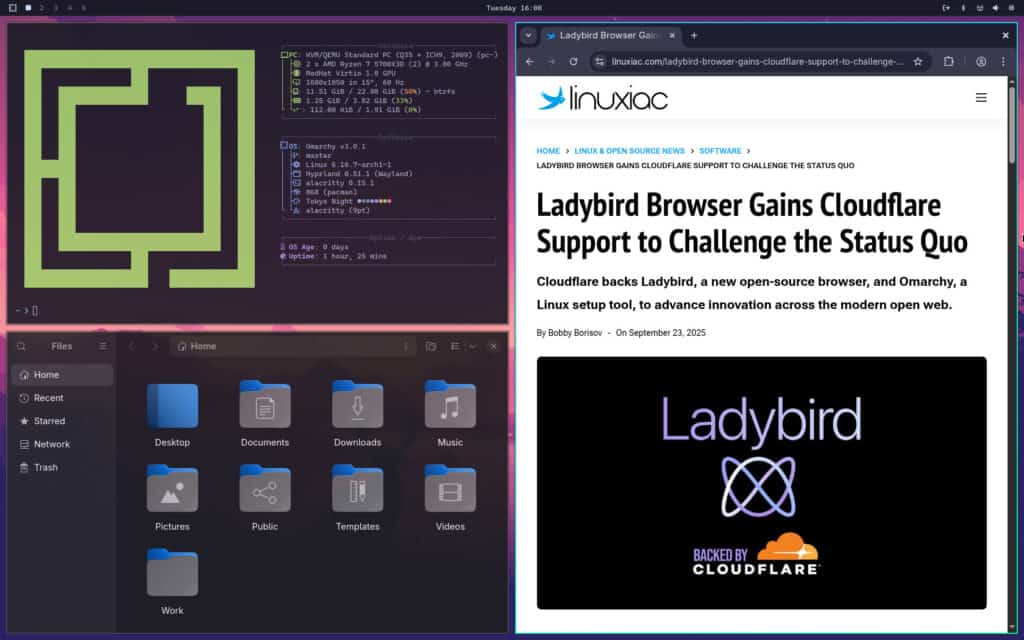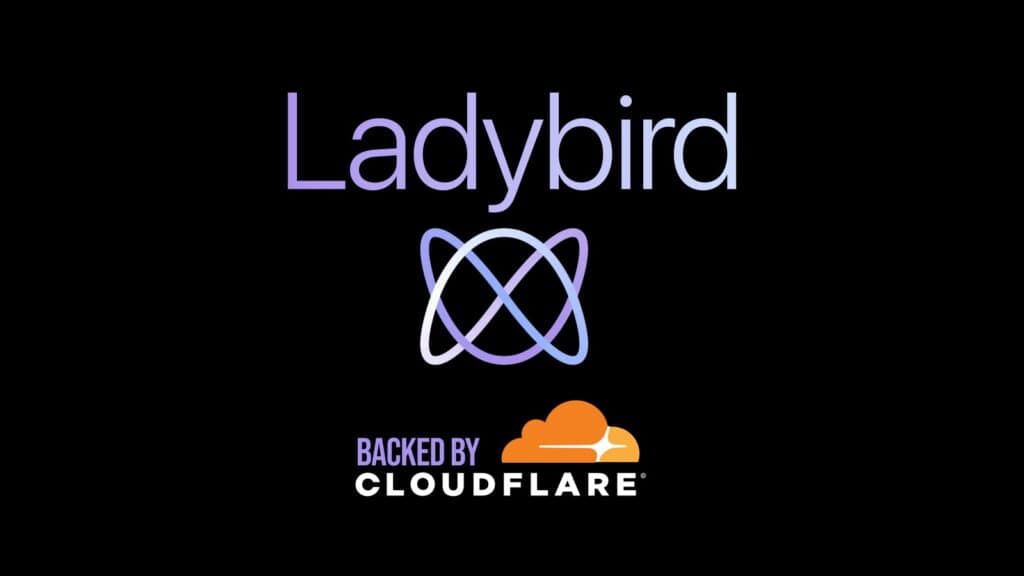In a somewhat unexpected move, Cloudflare has announced its sponsorship of the Ladybird browser, an independent (still-in-development) open-source initiative aimed at developing a modern, standalone web browser engine. It’s a project launched by GitHub’s co-founder and former CEO, Chris Wanstrath, and tech visionary Andreas Kling.
It’s written in C++, and designed to be fast, standards-compliant, and free of external dependencies. Its main selling point? Unlike most alternative browsers today, Ladybird doesn’t sit on top of Chromium or WebKit.
Instead, it’s building a completely new rendering engine from scratch, which is a rare thing in today’s web landscape. For reference, the vast majority of web traffic currently runs through engines developed by either Google (Blink/Chromium), Apple (WebKit), or Mozilla (Gecko).
The sponsorship means the Ladybird team will have more resources to accelerate development. This includes paying developers to work on crucial features, such as JavaScript support, rendering improvements, and compatibility with modern web applications. Just to remind you, last year the project was already funded with $1 million from Wanstrath and his family.
Cloudflare stated that its support is part of a broader initiative to keep the web open, where competition and multiple implementations can drive enhanced security, performance, and innovation. Now, for the second part of the news—yes, there’s more.
Along with backing the Ladybird browser, Cloudflare also chose to sponsor Omarchy—a preconfigured Arch Linux setup that ships with a Hyprland tiling window manager, along with a curated set of defaults and developer tools (Neovim, Docker, Git, etc).
Put simply, this isn’t a separate distro—it’s a tool that runs on Arch and sets up and configures Hyprland for you, so it’s ready to go right out of the box, so you end up with this.

Sure, you could set everything up manually by installing the right packages and tweaking a bunch of dotfiles. But Omarchy saves you the trouble—it simply asks you a few straightforward questions through an easy, menu-driven interface and prepares everything, hiding all complexity under the hood.
Still, it’s hard to understand why Cloudflare chose to back exactly Omarchy. Why not Arch itself, for example? Or how about another desktop-focused community-owned distro, like Linux Mint? For our more curious readers, the Omarchy project is led by someone who hardly needs an introduction—David Heinemeier Hansson, the creator of Ruby on Rails.
Now, don’t get me wrong—Hyprland is just awesome. However, like other tiling Wayland compositors, it’s a niche setup, primarily used by power users and individuals deeply involved in technical workflows.
That said, the only explanation for me is that Cloudflare clearly sees this Arch + Hyprland combo as one of the go-to environments for developers, and that’s why they’re putting their weight behind it. Either way, the move deserves a lot of respect, and it’ll be interesting to see how it all plays out.
For more information, see the official Cloudflare announcement.

”
designed to be fast, standards-compliant, and free of external dependencies. (…) building a completely new rendering engine from scratch (…) paying developers to work on crucial features, such as JavaScript support, rendering improvements, and compatibility with modern web applications.
”
This is both welcomed and interesting.
Opera used to have its own rendering engine (Presto) but they stopped development and decided in 2013 with Opera 15 to use Chrome’s rendering engine (Blink). Microsoft Edge used to have its own rendering engine (Edge) but they also stopped development (probably for money – profit – reasons) in 2020 and decided to use Chrome’s rendering engine starting with Edge version 18.
All I can say is this. Creating a fast, standards-compliant, versatile, competitive web browser with a completely new rendering engine will require a lot of time, a lot of money (developers, testers, reviewing) and a lot of people.
“Around 70% of our high severity security bugs are memory unsafety problems (that is, mistakes with C/C++ pointers).” To avoid memory problems with C/C++ pointers you need good programmers not Rust. About Cloudflare, it is a CDN, a DNS resolver, a website host… and now it is developing a browser and funding an operating system. GAFAMC?
To give an idea, according to https://openhub.net/p/chrome/analyses/latest/languages_summary, Chrome/Chromium has over 18 million lines of C++ code.
Some memory handling problem *will* crop up in there, no matter how many qualified developers working on it.
Also, developers sometimes have to cut corners due to impossible deadlines, testing and security are usually the ones which suffer more from it.
Reality is the mistakes are happening all the time which is causing security issues and large projects like the chromium project and firefox do not seem to have the ability to eliminate these coding errors without constant updates to fix these mistakes which seem to be never ending even microsoft and the linux kernel have the same issue. You can say we need better programmers that do not make mistakes but that is never going to happen since even the programmers that have been doing it for a long time make mistakes. The best solution is to switch to a more secure memory safe language which many projects are already starting to do or making plans to do. Having to constantly fix a ridiculous amount of mistakes means something needs to change. If you really understood the issue you would know the solution is not as easy as you say it is so maybe you should refrain from pretending like you understand what the solution is.
Ladybird and Omarchy, two openly non-woke projects. This is getting interesting.
I pretty much stick with Firefox of it clones like Waterfox and Librewolf. I want a top tool bar and to many browsers don’t have that. I will have to wait and see what Ladybird offers.
I agree I do not need constant changes to how my browser looks nor do I need all the extra bloated features they seem to want to push nowadays.
As for Ladybird, they’ve already announced they wanted to progressively switch to Swift (version 6, for better C++ bindings) instead of C++. Devs wanted to keep the same oriented-object code structure as C++ (Serenity OS is built in C++).
I guess Cloudflare invested in project its engineers use (and may have voted for). Ladybird is on OpenCollective, so I guess we’ll know one day how much Cloudflare is giving.
Both firefox and chromium are already using and adding rust. According to the chromium project Around 70% of our high severity security bugs are memory unsafety problems (that is, mistakes with C/C++ pointers). Half of those are use-after-free bugs. This project would have been better in my opinion if they would have used a memory safe language since most security issues we see that are having to be fixed constantly with updates are mostly from mistakes in coding which could have been avoided with a more modern memory safe language. Since other browsers are already adding and moving things to rust they will probably be a safer choice in the long run. I wish this project was doing the same since there are way to many serious vulnerabilities being discovered in browsers all the time due to coding errors. It will take many years to incorporate the rust language into major projects like firefox and chromium. Firefox is 13.6% rust currently and plans to keep adding more.
Typo firefox is 12.3% rust
Are you sure you didn’t just make a mistake? How could one typo 12.3 as 13.6, doesn’t make sense.
I put 13.6% when i should have put 12.3%.